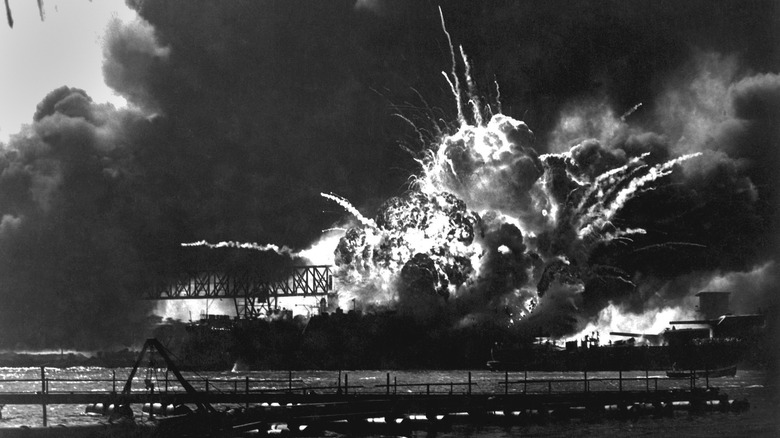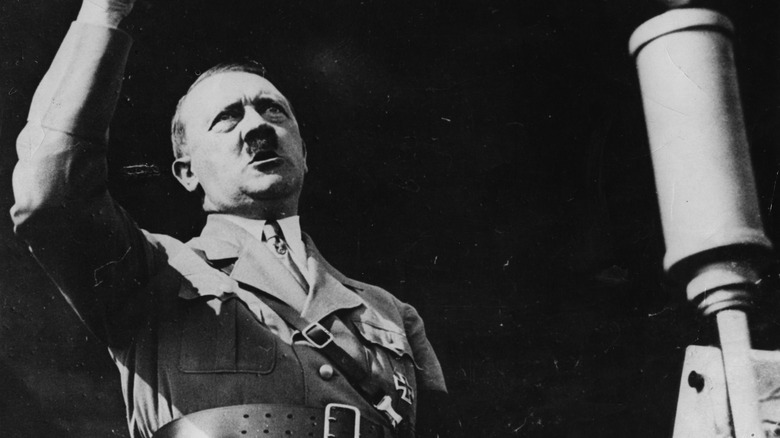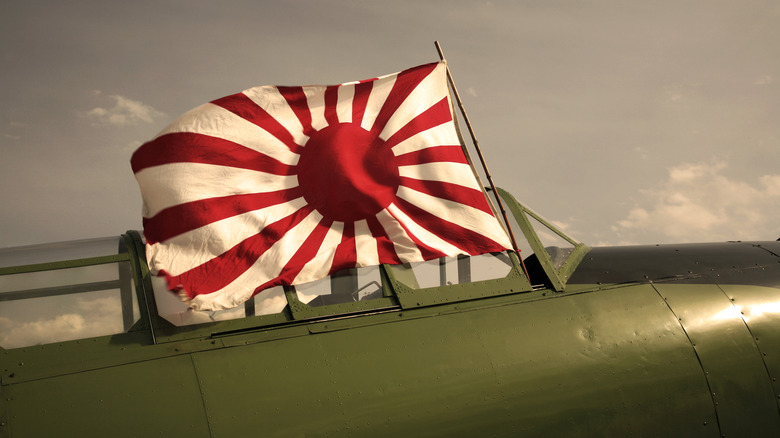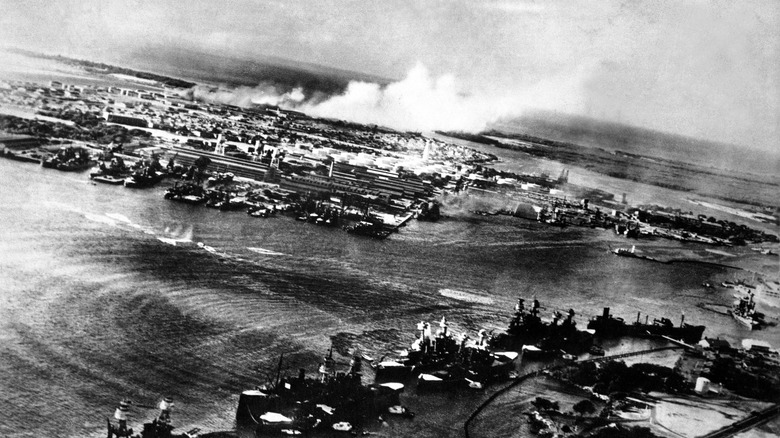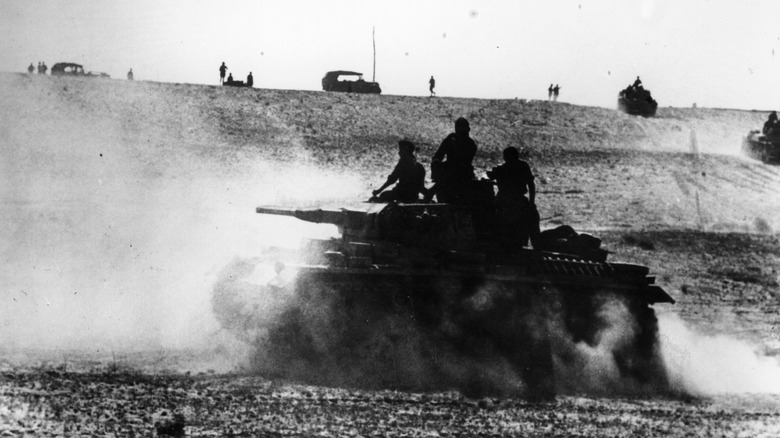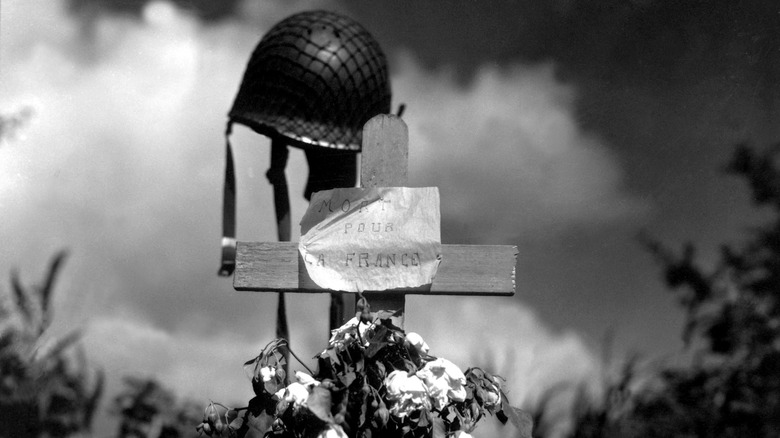What Hitler Really Thought Of Japan's Attack On Pearl Harbor
By December 1941, World War II had been in full swing for a couple of years. Nazi Germany, under the command of Adolf Hitler, had invaded Poland on September 1, 1939, under the pretense of a false flag event that claimed aggression on Poland's part, first. The United Kingdom and France declared war on Germany two days later on September 3, and two weeks later on September 17, Russia moved into Poland to counter Germany. By April of the following year Germany had taken Denmark, and by June, Norway. Italy entered the tumult a day later on June 10, 1940, on the side of Germany. In late September, Japan joined the war with Germany and Italy to form the Axis powers. The United States isolated itself from the rest of the world this entire time and refused to take part in a conflict off American soil. Then Pearl Harbor happened on December 7, 1941.
As Time says, when the U.S. Navy secretary broke the news to President Roosevelt all Roosevelt said was, "No." Leaders across the world reacted in their own ways. Joseph Stalin was just relieved that Japan hadn't attacked the Soviet Union. U.K. Prime Minister Winston Churchill was initially just as incredulous as Roosevelt. Despite an initial Japanese victory, Japanese Admiral Isoroku Yamamoto would later famously write, "I fear all we have done is to awaken a sleeping giant," per the U.S. Department of Veteran Affairs. And Hitler? As Military History Now recounts, he was "ecstatic."
The inevitability of defeat
World War I — aka the Great War — had left Germany humiliated, morally deflated, and its economy in ruins. As The University of Denver explains, the 1919 Treaty of Versailles forced Germany to give up colonies in Africa, Asia, and the Pacific, give back territory in France and Poland, pay war reparations to the countries that it had harmed, and accept ultimate responsibility for the war on a whole. Germany tried its hand at overhauling its government by instituting the very short-lived Weimar Republic, which collapsed by 1933. Four years earlier The Great Depression had rippled outward from the United States and crippled global economies, including Germany's. Into the gap stepped Adolf Hitler, promising a renewed, greater, more powerful Germany than ever.
Initially, Nazi Germany seemed a fearsome foe — and they were. To this day, "what if" scenarios abound regarding World War II, especially, "What if Nazi Germany won?" Sites like The National Interest say it was possible, except that Germany declared war on the U.S. four days after Pearl Harbor. And yet, The Holocaust Explained states that Germany's loss was all but inevitable, and boiled down to lengthening supply routes extended over too great of an area, and the lack of resources to sustain a long, widespread conflict. Nazi leadership might have foreseen this, even back in 1941. This is why Japan's entry into the war must have seemed like exactly what Germany needed.
The rise of an unexpected ally
In many ways, Japan was a strange and unlikely entry into World War II. As Japan Society explains, Japan went from a feudal, medieval society to a modern global superpower in only 31 years (1868 to 1889). Its leadership was eager to prove the nation's strength on the global stage and in East Asia, particularly. This is why, as Columbia University says, Japan joined World War I against Germany — to expand its sphere of influence over China and Korea. By the 1930s the Japanese military, which exerted strong force over its government, believed that Japan should conquer nearby nations to bring them to heel.
Come September 1940 — a mere 22 years after World War I ended — Japan flipped sides and officially entered World War II alongside Germany and Italy. In a self-interested vie for power, Japan invaded French Indochina (modern-day Vietnam, Cambodia, and Laos) five days prior. They also sought to stretch themselves further through Southeast Asia and the Pacific.
As the National World War II Museum explains, there was some tacit competition before then between the United States and Japan regarding Asian markets and natural resources. On top of this, the United States refused to acknowledge Japan's puppet government in Manchuria, Northeastern China, which Japan had established and dubbed Manchukuo. So, unbeknownst to any other nation, Japan planned its attack on Pearl Harbor in Hawaii, in the U.S.' westernmost, Pacific-lying state. On December 7, 1941, they struck.
An overwhelming blitzkrieg
As Pearl Harbor Tours explains, 15 out of the 102 ships stationed at Pearl Harbor on December 7, 1941, were lightly damaged. Eleven ships received moderate to severe damage, and seven ships sunk. Much more importantly, the attack left over 3,500 people wounded or dead. Japan didn't just attack Pearl Harbor, though. On the same day, the nation attacked Hong Kong, Thailand, Malaysia, Singapore, and U.S. military bases in Guam and the Philippines. All in all, it was precisely the type of sudden, overwhelming blitzkrieg — "lightning war" tactic — that Germany itself employed in World War II's early days to shock and terrify opponents.
The move came as a shock to German leadership, including Adolf Hitler. Nazi press chief Otto Dietrich broke the news to Hitler. At the time the Nazis were reeling from a failed attempt to march on Moscow during Operation Barbarossa, as the Imperial War Museums outlines.
When Hitler received the intercepted radio broadcast about Pearl Harbor, Military History Now says that he muttered, "Is the news true?" before bursting out of the building and running without a hat and coat to a nearby bunker to pass along the news to his military commanders. Commander Wilheim Keitel reports that this was the only time he'd ever seen Hitler so excited. "I had the impression," he said, "that he felt as if freed from a heavy load."
Reenergized for the war
Military History Now says that German Foreign Minister Joachim von Ribbentrop thought news about Pearl Harbor was "another propaganda trick of the enemy." Hitler called on the phone, and the two decided that Japan's actions were good for the Nazi war effort. One of Ribbentrop's attachés, Franz von Sonnleithner, pressed to have Japan's attacks described as a byproduct of German influence, but Hitler said, "Such a great people as the Japanese do exactly that which they believe to be right and will not be influenced by us in the slightest."
Germany, Italy, and Japan signed the Tripartite Pact back on September 27, 1940. The National World War II Museum explains that the treaty called for 10 years of military support from each member if attacked by a power "not involved in the European or in the Sino-Japanese Conflict" — this included the United States. After the December 7, 1941, Pearl Harbor attack, the U.S. declared war on Japan the following day, December 8. Hitler, at this point, knew that Germany would have no choice but to honor their treaty with Japan.
This led to Hitler's fateful decision to declare war on the U.S. three days later on December 11. At the time, German naval leaders said that Pearl Harbor, "marked not only a new phase in the military operations," but created a "global and pan-continental window onto the future order of the world," per Military History Now.
A fruitless pact
Despite Adolf Hitler's excitement at Japan having attacked the U.S., it was the United States' entry into World War II that tipped the scales in favor of Allied powers. As The History Reader explains, Hitler believed that Japan's involvement in World War II would draw attention away from the European front, and also distract from Germany's recent defeat in Russia. Per the Tripartite Pact Germany was obligated to aid Japan, but not necessarily declare open war on the U.S. And yet, Hitler went one step further and not only declared war on the U.S., but he did so in the most over-the-top way possible via an address to the German government. He raged at U.S. President Roosevelt as "the main culprit of this war," saying that Roosevelt was a pawn of the "entire satanic insidiousness" and "diabolical evil" of Jewish people.
Four years later World War II ended in 1945. The National World War II Museum says that Americans were in full support of joining the war, and thanks to a 1940 draft had already accumulated a military force of 2.2 million people the very month of the attack on Pearl Harbor. U.S. forces stood side-by-side with Allied forces in Europe and the Pacific, and Germany eventually admitted defeat. Hitler committed suicide on April 30, 1945, and the war officially ended when Japan surrendered on September 2, 1945, following the atomic bombings of Hiroshima and Nagasaki. This was the final result of Hitler's enthusiasm for Japanese involvement in the war.
